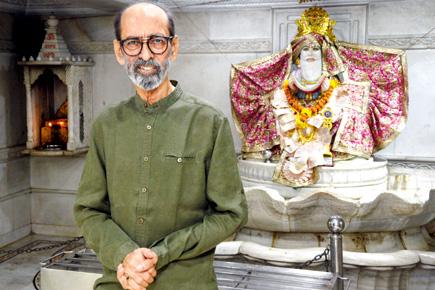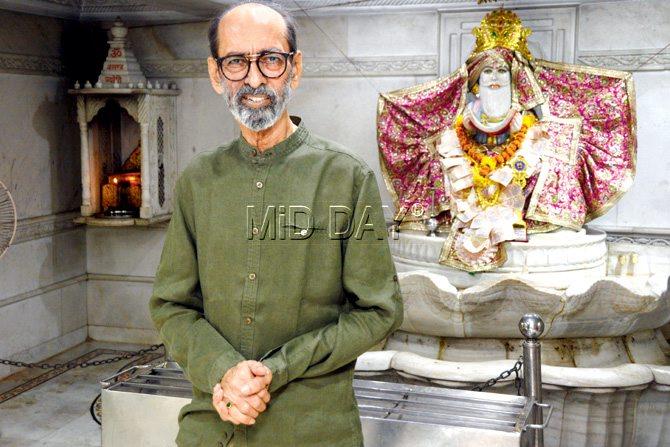Writer-critic Mohan Deep's latest anthology of short stories might be rooted in the Sindhi community but speaks to anyone who has experienced love for the homeland


Writer and critic Mohan Deep at the Purshottam Lalsai Dham Sindhi temple in Andheri. Deep's latest collection of short stories, Gul Sundri and Other Stories, set in the Partition era, enjoys the backdrop of a Sindhi shrine (durbar) transported from Larkana to a residential flat in Mumbai. Pics/Satej Shinde
ADVERTISEMENT
 Mohan Deep's love saga originates in Pakistan's Sindh province and culminates on Marve beach in Mumbai's western suburb of Malad. Etching nonconformist Sindhi characters, like that of Gulab Shivdasani and Sundri Kataria, is his way of countering Bollywood's 'vadi sai' Sindhi stereotype.
Mohan Deep's love saga originates in Pakistan's Sindh province and culminates on Marve beach in Mumbai's western suburb of Malad. Etching nonconformist Sindhi characters, like that of Gulab Shivdasani and Sundri Kataria, is his way of countering Bollywood's 'vadi sai' Sindhi stereotype.
In the 70th year of India's Independence, and its Partition, the about-to-turn 70-year-old writer and critic dedicates his latest anthology to the Sindhi community. Gul Sundri and Other Short Stories from Sindh (Quest Mercury Intermedia Limited), is a cluster of 16 stories written at various points in his life, some as far back as 1975 when India was in a state of Emergency, others written and published for reputed Sindhi weeklies like Hindvasi. Deep says, although his characters belong to a socio-ethnic group originating from a province that sits in present-day Pakistan, they will speak to any reader who can relate to the dilemma of suffering and surviving the loss of a homeland.
The writer himself lives with defining memories of his family's social transition caused by the Partition, when his parents arrived from Karachi to Mumbai by ship. He was born Mohan Kishinchand Chandiramani in 1948 Agra, and raised in a calmer Mumbai. It's not so much history but the presence of books at his Irani Wadi chawl home in Kandivli, ranging from Maxim Gorky to VS Khandekar, that impacted his early years. "What stayed with me was the fact that despite the panic in which mom and dad had left their birthplace, they were alert enough to have brought books back with them, rich Sindhi translations of Marathi, Bengali, even Russian literature," he says.
Deep wrote his first Sindhi poem at 11, which was published in Hindvasi, a weekly that has now turned bilingual and has completed a century. In fact, way before he became an English language film critic (credited with titles like Eurekha! – An Unauthorized biography of Rekha; Simply Scandalous: Meena Kumari), he was a short story writer and novelist. He now holds a body of 200 Sindhi short stories, two novels, and a collection of poems named Munhje Paachhe Jo Hik Hisso (A Part of My Shadow).
Deep attributes his success as a bi-lingual writer to Mumbai, a city that's home to myriad languages. The knowledge of various bhaashas brought him closer to the cultural mosaic that would have otherwise missed him, he believes. Gul Sundri, his lead story from the collection, stands testimony to this approach of using language as an entry point into culture. Gul and Sundri have been sculpted in the tradition of Sindhi love legends like Mumal Rano, Umar Maruee, Sohni Mehar and Leela Chanesar. As is the case with these mythical romantic pairs, they take on colourful lives as per the narrator's orientation. In Deep's fictional world, Gul and Sundri fall for each other in conservative Larkana during a politically charged time when Hindu Sindhi families felt defenseless in the newly-formed Muslim-dominated Pakistan.
The pair cannot marry. Gul is a rich, high caste, landowning Sindhi who moves to Bombay, and struggles to make a life out of his Kandivli kholi. Sundri, the daughter of a hotheaded trustee of a Sufi shrine and a Bhagnari Sindhi by caste, is likely to be killed if she marries outside the fold. It is another story that the lead pair meets a violent end after they unite in far-off Marve amid support from Koli fisher folk who risk their lives to save two strangers.
While the sequence of events is imaginary, Gul Sundri is premised around a real-life middle-of-the-night stealthy transportation of a shrine (durbar) from Larkana to a residential flat in a western suburb of this city. Deep's is a credible take on an outrageous theft committed by supposedly peace-loving durbar controllers, believers of Sufi philosophy, who didn't flinch at stealing jewellery from a holy precinct.
Sundri's father doesn't hesitate before stuffing precious gems into semi-fried bhajias and parathas to be cooked again and packed in large tiffin boxes. This speaks of human behaviour in times of political chaos, Deep believes. He has changed the name of the shrine because his intent is not to expose the high and mighty after a long passage of time, but to focus on human compulsions. He tried connecting with the trustees of the original shrine in Pakistan, and ironically, they were less guarded than those in Mumbai, who declined to talk, states the epilogue.
The story trashes the stereotypical Sindhi, who Deep hates to encounter in Bollywood and on Johnny Lever shows. His characters deviate from the norm — whether it's the writer who doesn't buckle under pressure in Zip or the struggling middle-class man who decides to waive a personal loan in On The Death of a Friend.
The writer feels that the flashiness and excessive security-consciousness [evident in stereotypes] is a side-effect of financial struggle, success and competition that the community has seen. Sindhi plays and poetry, and other literature speak for the strength of the intelligentsia from the community.
Sumedha Raikar-Mhatre is a culture columnist in search of the sub-text. You can reach her at sumedha.raikar@gmail.com
 Subscribe today by clicking the link and stay updated with the latest news!" Click here!
Subscribe today by clicking the link and stay updated with the latest news!" Click here!






